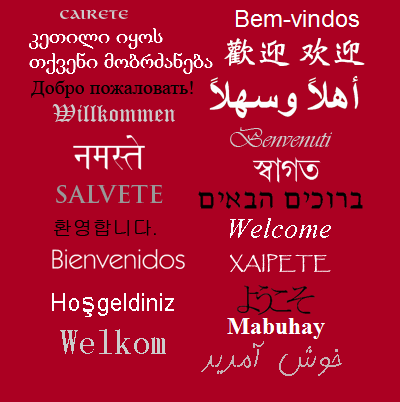 Greetings is called ucapan salam or sapaan in Bahasa Indonesia. Let's start with common greetings.
Greetings is called ucapan salam or sapaan in Bahasa Indonesia. Let's start with common greetings.Hello ==> Halo
Hi ==> Hai (pronounced exactly the same as hi in english)
Welcome ==> Selamat datang
Good morning ==> Selamat pagi
Good day ==> Selamat siang (when you meant to greet someone in midday)
If you want to state that it is a good day then you say Hari yang baik or Hari yang menyenangkan.
Good afternoon ==> Selamat sore
Good evening ==> Selamat malam
Good night ==> when you (or the one you talk to) is about to go to bed, then you say Selamat tidur (Have a (good) sleep!)
Good bye ==> Selamat tinggal or Selamat jalan
Nice to meet you ==> Senang berkenalan dengan Anda/kamu (close literal translation: (I am) delighted to be acquainted with you)
Thank you == Terima kasih (l.t.: take (this) love)
You're welcome == Sama-sama (inf.)(l.t.: also (feeling) the same (here)), kembali (l.t.: back (at you))
Excuse me == Permisi or maaf (inf.)
Special greetings that you only say occasionally:
Have fun ==> Selamat bersenang-senang
Happy anniversary ==> Selamat ulang tahun pernikahan or Selamat hari jadi
Happy birthday ==> Selamat ulang tahun
Happy Easter ==> Selamat hari Paskah
Happy holiday ==> Selamat berlibur
Merry Christmas ==> Selamat hari Natal or Selamat Natal
Good luck ==> Semoga berhasil (lit. trans.: I hope (you) succeed. Semoga = I hope; berhasil = succeed, successful)
Other greetings that probably don't have any equivalence in english:
Selamat mencicipi ==> when you let the one(s) you talk to (and yourself) taste (a) food(s) or (a) drink(s) after you/someone served them. Probably equivalent to French bon appétit. (mencicipi = tasting)
Selamat mencoba ==> when you let him/her/them try something (usually an activity, but also opens in possibilty for foods or drinks or toys or other things). (mencoba = trying)
Selamat menikmati ==> when you let him/her/them enjoy something (usually foods or drinks). (menikmati = enjoying)
Selamat makan ==> when you let the one(s) you talk to (and yourself) eat. Close equivalence in english for this is "enjoy your meal/food". (makan = to eat)
You must be wondering, what are the differences between selamat mencicipi, selamat menikmati, and selamat makan?
Before you say selamat mencicipi usually you already talked about the food. Maybe it's because you just learned how to cook, or you learned a new recipe, or you hire a new cook. And you can say this when you also join them in tasting the food.
In selamat menikmati, you let other(s) eats food in which you have a confidence that the food will taste at least good/enjoyable. You usually see this in a restaurant take out box. Selamat menikmati also opens for any case of enjoyment.
In selamat makan, you say it before he/she/they (and you) eat. It's similar to itadakimasu in japanese. Only in selamat makan the purpose is not to thank god for the food, but simply saying let's eat now or you may eat now in a more cheerful but polite way.
0 comments:
Post a Comment